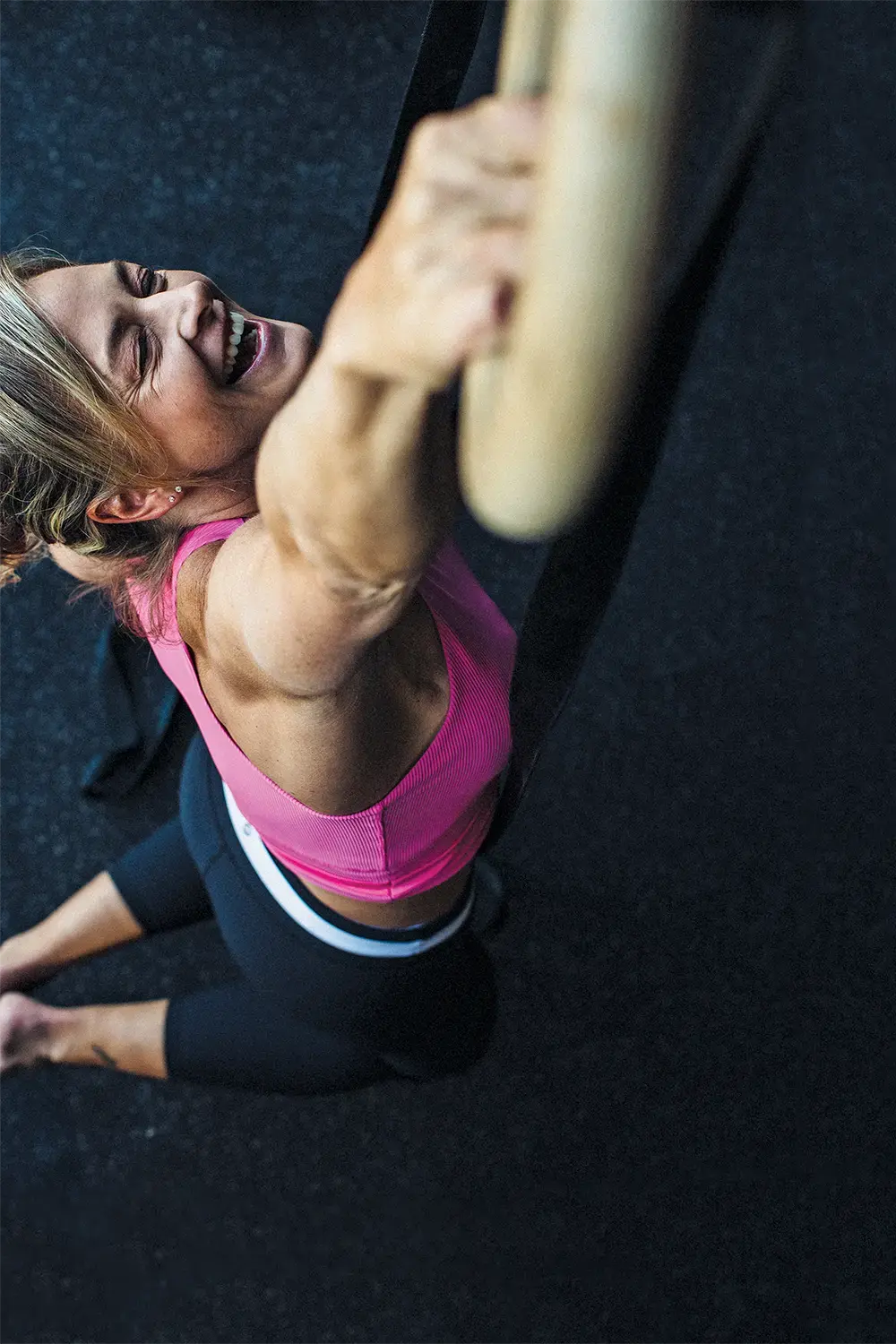Is a muscle-up the new glow-up? A cross section of local women embracing a shift in female fitness—from a goal of aesthetics to strength.
Story and Photography by Jessica Crandlemire
Hair and Makeup by Taylor Savage
Styling by Nicole Bishop
Shot on location at Primitive Patterns
Clothing provided by Bishop Consignment and Okay Alright Shoppe
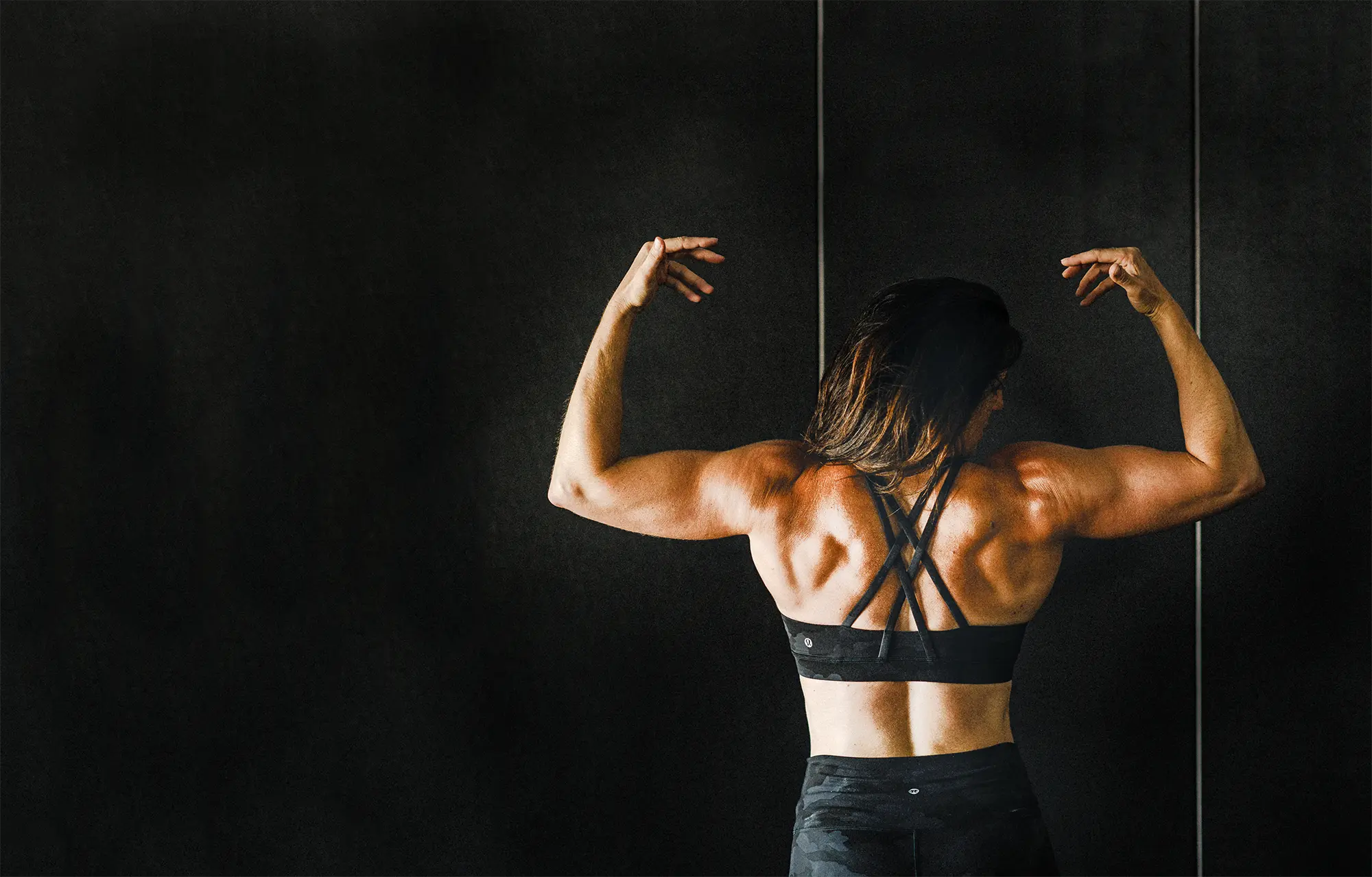
Can women be strong and beautiful? Have we at long last come to a point in this culture where we recognize those muscles that hold us up, and keep us moving and working through life, as not only as essential in a woman as in a man, but also pretty freaking breathtaking? Some exploration in the current mindset of women in strength training, combined with beliefs that surround beauty and femininity, leaves me hopeful, albeit a little disappointed. While we are making leaps, we still have a long way to go in overcoming old tropes and devastating beauty ideals that have plagued women for decades.
I am pretty passionate about the transformative experience I’ve had in my own body since shifting from more sport-related activities like aerial silks and pole to beginning more traditional weight training in the spring of 2020. When I started training with Primitive Patterns (a Collingwood-based gym that provides semi-private and private personal training) and saw the opportunity it brought to alter my body, I was enchanted with the process. For me as a photographer and lover of the human form, watching my new muscles move was incredibly powerful. I felt possibility that I hadn’t even considered before, and it was exciting. As someone who spends a lot of time in the company of strong women, I assumed everyone felt this way.
My goal was to shed some insight into this mindset by sharing expertise of women in the local fitness industry at various stages of life and training. I was curious to know if they had seen or felt changes. Do they see more women in the free-weight section of the gym as opposed to the areas with cardio equipment and floor mats? Furthermore, what are their personal feelings about their bodies as women who are seen as particularly strong.
Women who are already in this arena are the best ones to help educate others. Women as role models are a huge reason for the shift in perception. We have more women prioritizing their strength and the younger generation are feeling inspired but also have access to more education.
The reasons to start picking up the big weights in the gym are plentiful. We have a lot of new research to bolster them. We start to lose muscle mass in our thirties, and if we are not actively combating that loss we are more and more vulnerable to injury and less and less able to recover. You can’t function without muscle! We need to remember that. The simplest act of getting up off the ground in our eighties—that’s what we are preparing for.
The question that arises for me is, how do we better support our community? How do we open up the conversation so knowledge is being shared and used by everyone. I know we have the voices we need, there are so many of them here and they have so much to offer. But how do we make their knowledge and inspiration accessible to more of the women who need to see and hear it?
When it comes to tropes around beauty, like Ella Cloutier says below, let’s “undecide” that strong isn’t beautiful. Maybe that curve in your deltoid is part of what makes your arm super-sexy. Personally, I think Baby needs all the back she can get.
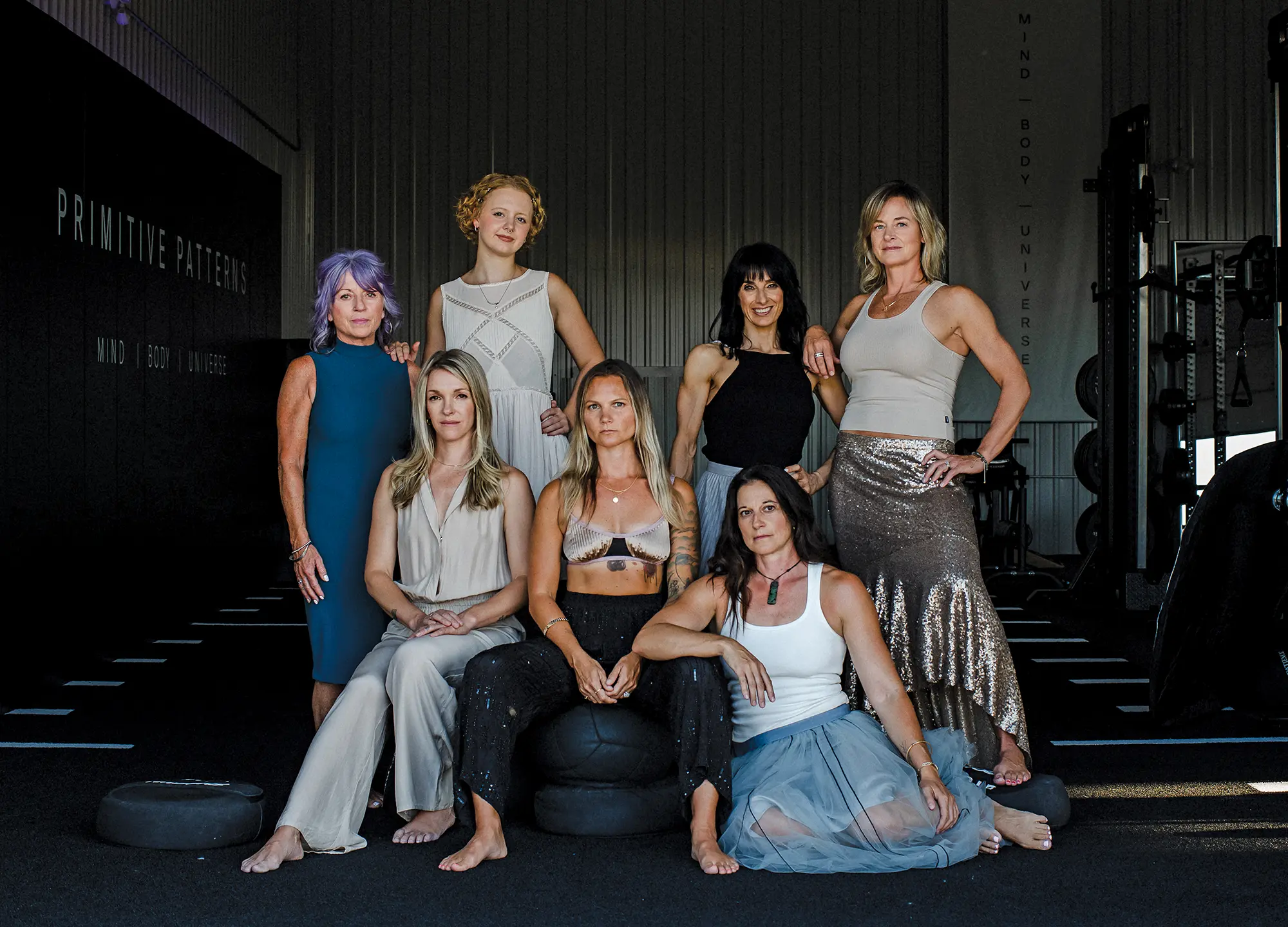
Back row left to right: Carol Burella, Ella Cloutier, Rose Carlucci Scoville, Michelle Smeh
Front row: Jaqueline Poirier, Lydia Cloutier, Jessica Crandlemire
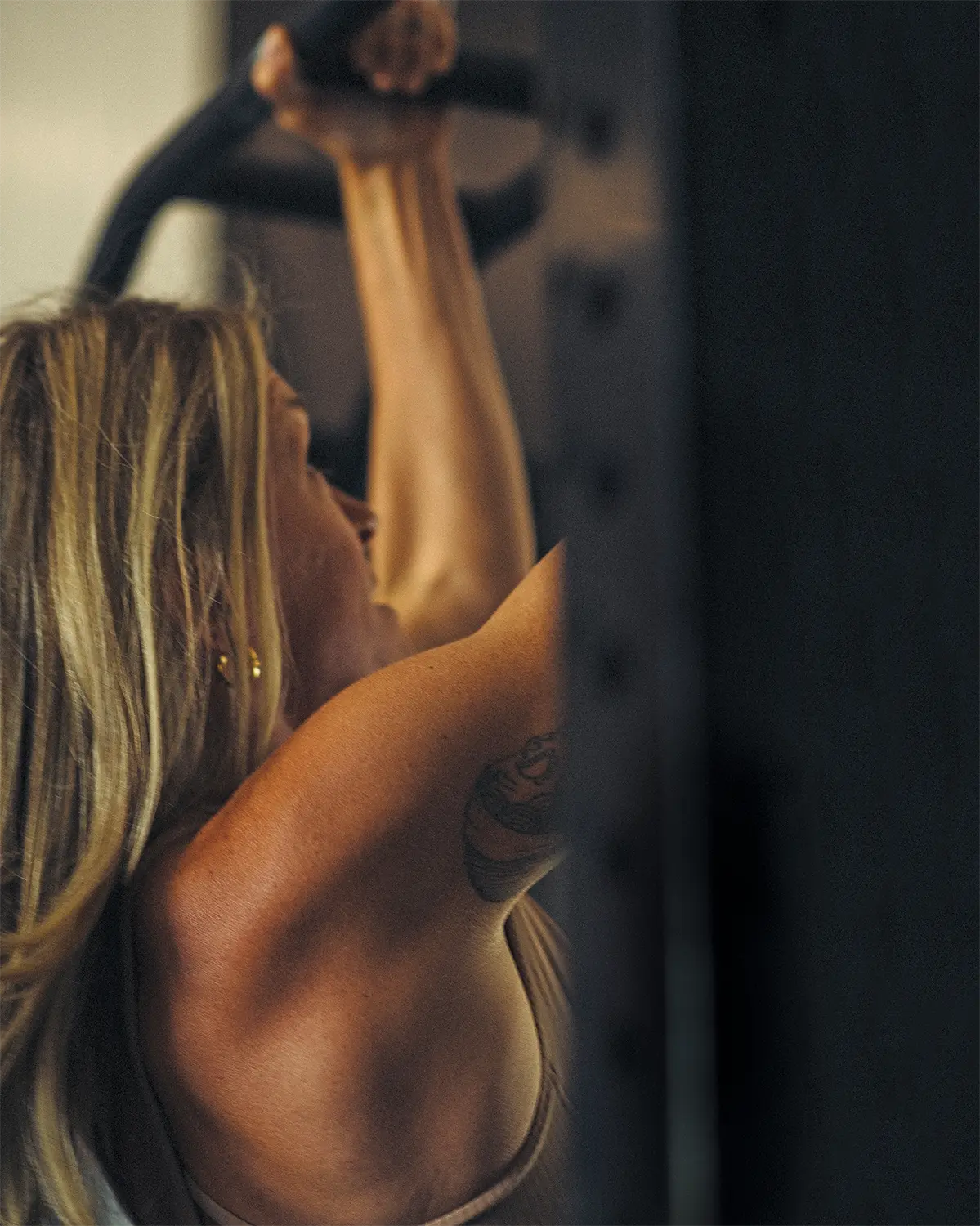
Jacqueline Poirier—entrepreneur, athlete new to lifting weights
“A year ago I was in a very different place. Postpartum with my third child, my body felt fragile and depleted,” says Jacqueline Poirier. She was struggling with chronic back pain from previous injury, as well as a history of poor eating habits and irregular exercise. She says she was thin, and felt weak.
“Despite feeling intimidated, I committed to strength training,” says Jacqueline. She says she started to do all kinds of things she had never done before, lifting weights, mastering squats, and attempting pull-ups. Within weeks she started to see changes in her body. She saw new definition in her muscles and felt a decline in the chronic pain.
“Six months in, I was pain-free and craving the movement. I finally felt confident in my own skin,” she recalls. Just shy of one year into training, Jaqueline was diagnosed with a femoral hernia. She required surgery and potentially a long recovery. She healed in record time and is stronger than ever.
“Strength training has given me confidence I didn’t even know I was missing,” Jacqueline says. “This past year has reshaped not just my body but my entire outlook. Strong is the new sexy and being fit is the new standard.”
Lydia Cloutier —midwife-in-training, former paramedic, Ella’s mum
Lydia, Ella’s mum and training partner, admits she never felt at home in a gym environment and that was a big incentive to get her kids into fitness early on.
“Women of our generation had always been intimidated by the gym. I didn’t want that for my girls. My first time lifting was a pump class at the Y. It was a good introduction to feeling comfortable with weights. Even taking them on and off the bar is something I hadn’t done and felt intimidated by.”
Following chronic back pain that persisted after an injury, Lydia tried everything to heal herself. Lifting weights was the first thing that began to provide real relief and sustainable recovery. Her body getting stronger as a whole helped to properly support and speed the healing process.
“I want to keep doing everything I do currently, I don’t want to be in pain or restricted. I want to set a good example for my kids. I like them seeing me looking strong,” Lydia says. She sees weightlifting as one way to combat the diet issues that seem to overwhelmingly affect women. “Literally every woman has issues around food to a varying extent. We are failing in some way around nutrition and eating. Whether it’s social media, or family, or community influence. That said, I eat what I want now. I enjoy it and I’m proud of the strong body I’m supporting. When you feel good in your body it influences everything around you.”
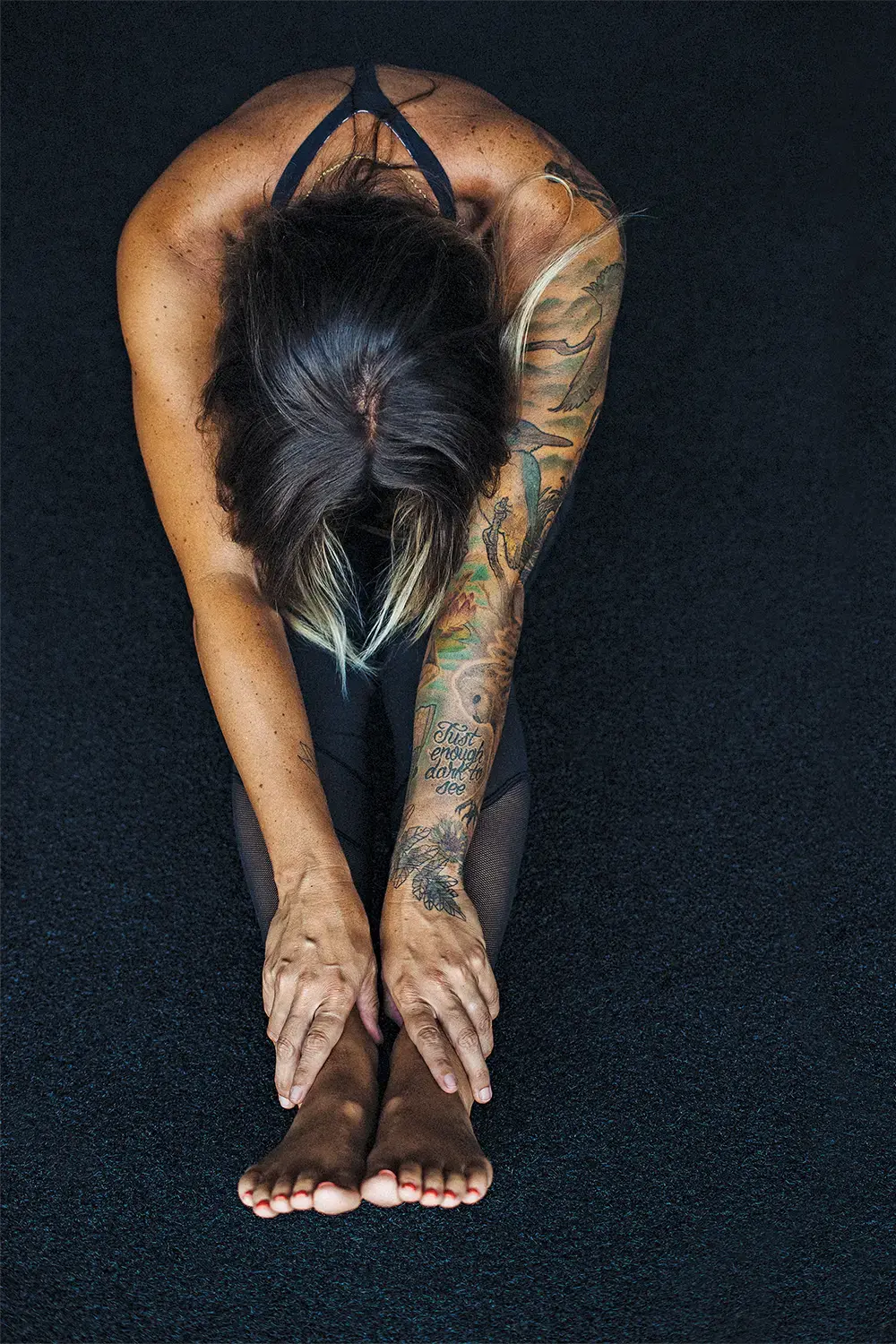
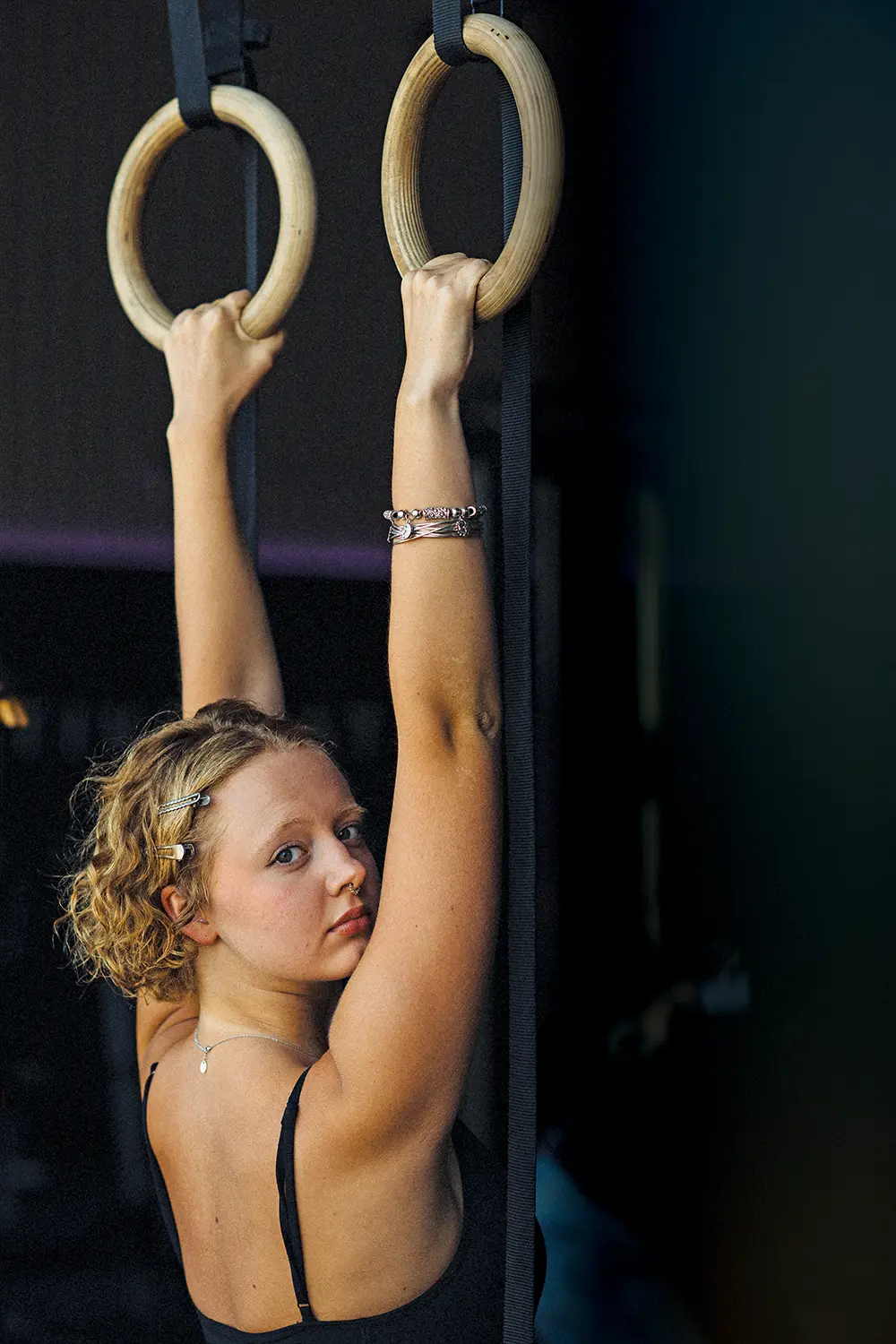
Ella Cloutier —student at Stayner Collegiate Institute
Ella Cloutier is a hopeful voice of a future generation of strong women. Ella is 16 and trains with her mom at Primitive Patterns. Ella is excited to see herself getting stronger and inspired to keep going because of the strong women she sees in her life. She feels encouraged by the example of her mother and excited by the changes she has seen in her own body since starting to focus more on strength training. Not only does she want to build muscle, but she knows that being in the gym makes her feel healthy emotionally. She notices right away that if she skips a workout, there is a decline in her mental health and she wants to protect that.
Ella has seen this strength focus set her apart from other girls her age. They are still very affected by the beauty aesthetic pushed on them in the media and enforced by peers and close influences. Social media continues to bolster the belief that slim is synonymous with beautiful, and Ella acknowledges that she and many of her friends have struggled with issues around food as well as body image.
“I have broader shoulders and it makes me feel less-than, I don’t even know where I learned that,” she says. When asked if she felt “bigger” since gaining more muscle tone her response is firm, “No, even if I got bigger that would be OK. I don’t feel like any amount of muscle on a woman can take away their femininity. Who decided that going to the gym and getting muscular isn’t beautiful? Like, we can just undecide!”
Carol Burella—former instructor at Wasaga Beach YMCA, trainer at Primitive Patterns Collingwood
At 57, Carol has been both an athlete and trainer. Her love for fitness radiates, but when you dig beneath the surface you come to understand that it has been a lifeline through some of the hardest stages of her life.
Sports were integral to her early identity. She bought her first membership at Gold’s Gym at age 19. Being of smaller stature, she loved the feeling of being strong. While Carol admits she has never felt out of place in the weight room, she also acknowledges this is not common for women.
“Women believed that cardio is what would get them lean,” Carol says. “There was a problematic difference where men came in to get strong but women came to the gym to lose weight.”
In more recent years as a trainer, Carol has observed some very positive changes in the approach of women who come to train with her. Younger women are coming with strength training in mind. There is less fear around muscle gain. It is still more of a struggle with previous generations because they are so conditioned.
When women do come into Primitive Patterns to train with her, Carol says she is thrilled not to hear the “spot targeting” of “my hips” or “my stomach.”
“Women are also now looking to take care of their mental health,” she says. “This is a shift. We used to understand that we ‘felt’ better, but we understand those benefits far more specifically now.”
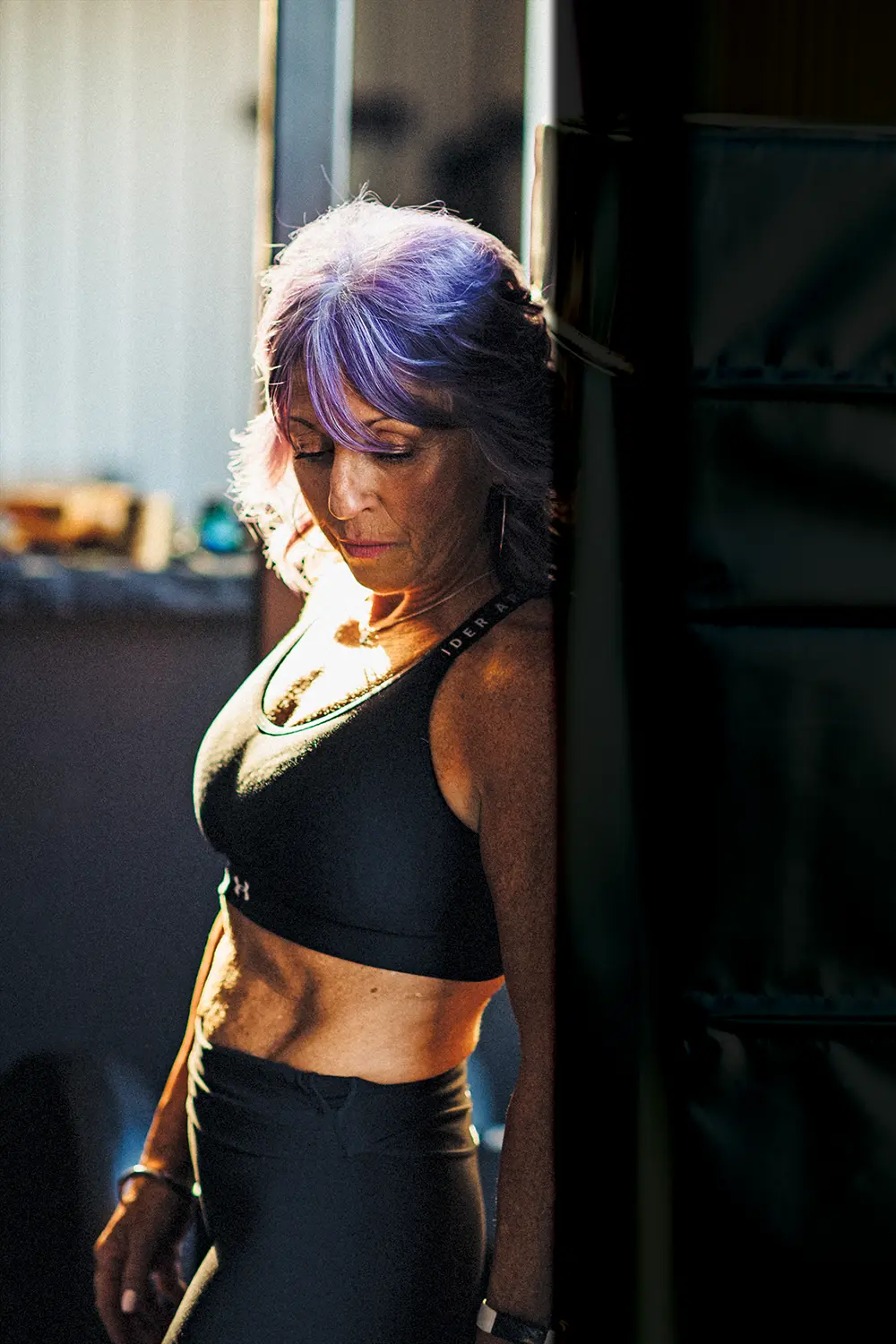
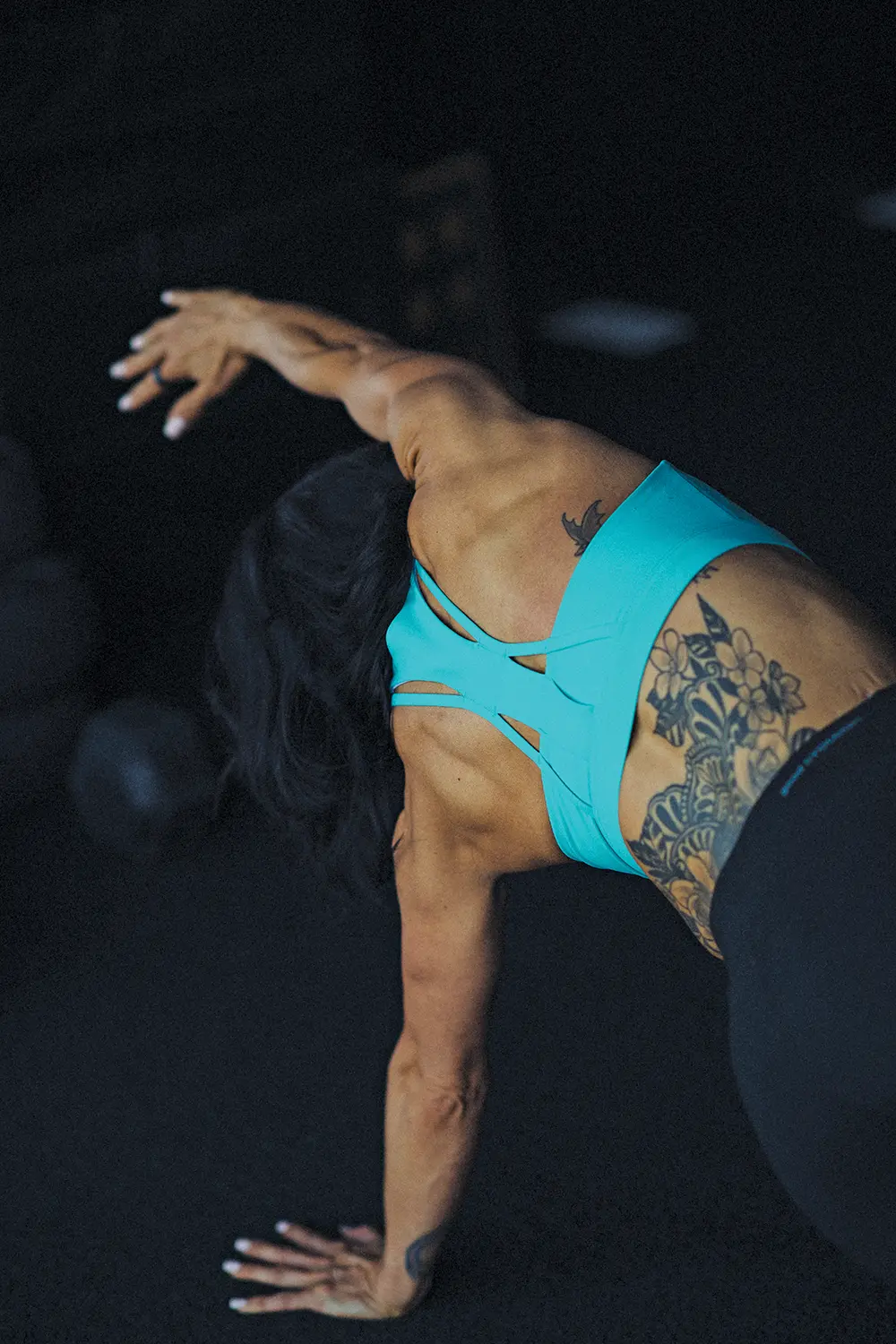
Rose Carlucci Scoville—business owner, bodybuilder and competitor
Rose Carlucci Scoville is a longtime athlete and competitive bodybuilder. She is another woman who has always been at home in the gym and always believed in the importance of being active, healthy and strong. Her dedication is inspiring. The results speak for themselves.
“With aging it becomes even more important, for longevity and independence,” Rose says of weightlifting. “The shift to muscle-building as we age is significant. There is more awareness that it’s not just about what you look like, but when you look good you feel better. It’s all connected to our mental health. As much as possible, I don’t want to be on pharmaceuticals, I eat with protein and muscle growth in mind.
“I hope to be perceived as looking strong, I hate when people call me skinny. When you make one good choice, the other ones just follow easily, and when you feel good on the inside, it shows.”
Michele Smeh—gym owner and trainer at Gym Giant Collingwood
Michele Smeh is a trainer and coach who has honed her skill specifically to helping women in their perimenopause and menopause years. She helps set them on a path to be as strong and healthy as they are capable of.
Michele started lifting weights in Grade 10 with the boys in high school (no girls wanted to lift weights). She loved the idea of being strong and muscular. She wanted to jump high and have strong legs.
“Once I saw how quickly you could build muscle and how quickly you could come back to it once you had established that, I knew I would always lift,” Michele says. “Aesthetics always were a part of it. I always loved the look of muscle. But I know I was the only one of my peers for a long time.”
She says even now most women come to her looking to lose weight. She uses this motivation to start the conversation. They come to her because of fears around physical changes and noticing weight gain. She knows strength training is the key. Especially for women in menopause and perimenopause, the HIIT (high-intensity interval training) classes and extreme cardio are much more taxing on their adrenal system and actually not as helpful as lifting.
“I actually have to teach them to eat more food. Most women are eating half the amount of protein they need,” Michele says. “What actually happens is they do see weight loss in the initial stages because they are training and eating properly. We grew up in a society where our moms were eating the cabbage soup diet!
Even when we know better, it’s so ingrained in our programming this takes time to unlearn. We also grew up with all the information around fitness being based on research with men. We have new information now. Changing your mind takes time, and seeing the result is the only way to slowly effect this change.”
When asked if the perception of being “bulky” or “masculine” is still a concern for her clients, Michele laughs, “Yes, all the time. The bottom line is you have to work so hard, especially 40 and beyond, to build any muscle. Because men have always owned that arena of fitness, it may be that we have adopted this idea that weightlifting makes you big and masculine. Lifting weight doesn’t need to make you bulky—it may just keep you out of the nursing home.”
